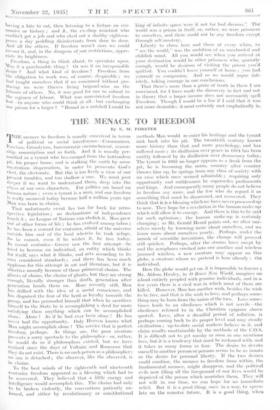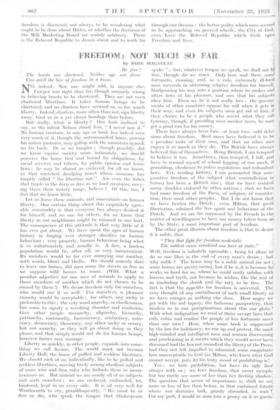THE MENACE TO FREEDOM
FORSTER IIE menace to freedom is usually conceived in terms
T
' of political or social interference—Communism, Fascism, Grundyism, bureaueratic'encroachment, censor- ship, conscription and so forth. And it is usually per- Sonified as a tyrant who has escaped from the bottomless Pit, his proper home, and is stalking the earth by some mysterious dispensation, in order to persecute God's clect, the electorate. But this is too lively a view of our present troubles, and too shallow a one. We must peer deeper if we want to understand them, deep into the abyss of our own characters. For politics are based on human nature ; even a tyrant is a man, and our freedom is really menaced today because half a million years ago :‘111,11 was born in chains. • .
That unfortunate event lies too far back for retro- speetiyc legislation ; no declarations of independence touch it ; no League of Nations can abolish it. Man grew I vi 1 t of other fOrms of life ; he has evolved among tabus ; he has been a coward for centuries, afraid of the universe Outside him and of the herd wherein he took refuge. So lie cannot, even if he wishes it, be free today. In centuries—( :recce centuries—reece saw the first attempt—he tried to become an individual, an entity which thinks for itself, says what it thinks, and acts according to its own considered standards ; and there, has been much ;1 ppla tise for this attempt in art and literature, but it is i bort i ye morally because of those primaeval chains. The 1,:hosi s of chains, the chains of ghosts, but they are strong vuough, literally stronger than death, generation after generation hands them on. More recently still, Man has dallied with the idea of a social conscience, and has disguised the fear of the herd as loyalty towards the group, and has persuaded biniself that when lie sacrifices himself to the State he is accomplishing a, deed far more satisfying than anything, which can be accomplished alone. Alone! As if he had ever been alone 1 He has never had the opportunity. Only Heaven knows what Mini might accomplish alone I The service that is perfect freedonb perhaps. As things are, the poor creature presents a sorry spectacle to the philosopher—or, rather, lie would do so if philosophers existed, but we have realised since the days of Voltaire and Rousseau that they do not exist. There is no such person as a philosopher; no One is detached ; the observer, like the observed, is In chains.
, To the best minds of the eighteenth and nineteenth centuries freedom appeared as a blessing which had to be recovered. They believed that a little energy and intelligence would accomplish this. The chains had only to be broken violently, the conventions patiently un- loosed, and either by revolutionary or constitutional methods Man would re-enter his heritage and the tyrant sink baCk into his pit. The twentieth century knows more history than that and more psychology, and has suffered more ; its disillusion over peace in 1914 has been swiftly followed by its disillusion over democracy today. The tyrant in 1935 no longer appears as a freak from the pit, he is becoming the norm, country alter country throws him up, he springs from any class of society with mu ease which once seemed admirable ; requiring only opportunity and ruthlessness he supersedes parliaments and kings. And consequently many people do not believe in freedom any more, and the few who do regard it as something that must be discovered, not recovered. . They think that it is a blessing which we have never possessed up to now. They hope for a revelation in the human make-lip which will allow it to emerge. And there is this to .be said for such optimism : the human make-up is certainly changing ; as Mr. Gerald Heard points out, we alter our- selves merely by knowing more about ourselves, and we know more about ourselves yearly. Perhaps, under the inrush of scientific inventions, the change will proceed still quicker. Perhaps, after the storms have swept, by and the aeroplanes crashed into one another and wireless jammed wireless, a new creature may appear on this globe, a creature whom we pretend is here already : the individual.
How the globe would get on, it is impossible to foresee ; Mr. Aldous Huxley, in 0 Brave New World, imagines an, island entirely peopled with genuine individuals, and in a. few years there is a civil war, in which most of them are killed. However, Man has another wish, besides the wish to be free, and that is the wish to love, and perhaps some- thing may be born from the union of the two. Love some- times leads to an obedience which is not servile—the obedience referred to in the Christian epigram above quoted. Love, after a dreadful period of inflation, is perhaps coming back to its proper level and may steady civilisation ; up-to-date social workers believe in it, and claim results unattainable by the methods of the C.O.S. It is difficult not to get mushy as soon as one mentions love, but it is a tendency that must be reckoned with, and it takes as many forms as fear. The desire to devote oneself to another person or persons seems to be as innate as the desire for personal liberty. If the two desires could combine, the menace to freedom from within. the fundamental menace, might disappear, and the political evils now filling all the foreground of our lives would be deprived of the poison which nourishes them, They will not wilt in mu• time, we can hope for no immediate relief. But it is a good thing, once in a way, to specu- late on the remoter future, It is a good thing, when freedom is discussed, not always to be wondering what ought to be done about Hitler, or whether the decisions of the Milk Marketing Board are unduly arbitrary. There is the Beloved Republic to dream about and to work for through our dreams : the better polity which once seemed to be approaching on greased wheels ; the City of God; even Love the Beloved Republic which feeds upon Freedom and lives.































































































 Previous page
Previous page